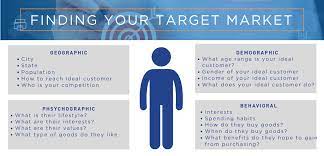The Importance of Understanding Your Target Market
In the world of business, understanding your target market is crucial for success. Your target market refers to the specific group of consumers that your products or services are aimed at. By identifying and understanding this group, you can tailor your marketing strategies to effectively reach and engage with them.
One of the key benefits of defining your target market is that it allows you to focus your resources and efforts on those who are most likely to be interested in what you have to offer. By understanding their needs, preferences, and behaviours, you can create targeted marketing campaigns that resonate with them and drive better results.
Moreover, knowing your target market enables you to differentiate your brand from competitors. By tailoring your messaging and positioning to appeal specifically to your target audience, you can stand out in a crowded marketplace and build stronger connections with potential customers.
Additionally, understanding your target market can help you identify new opportunities for growth and expansion. By analysing market trends and consumer insights within your target demographic, you can uncover unmet needs or emerging trends that present opportunities for innovation and diversification.
In conclusion, understanding your target market is essential for any business looking to succeed in today’s competitive landscape. By identifying who your ideal customers are and what drives their purchasing decisions, you can create more effective marketing strategies, differentiate your brand, and uncover new growth opportunities.
Six Essential Tips for Effectively Identifying and Engaging Your Target Market
- Identify your target market by conducting thorough market research.
- Understand the demographics, psychographics and behaviour of your target audience.
- Tailor your marketing messages to resonate with the needs and preferences of your target market.
- Utilise different channels to reach your target market effectively, such as social media, email marketing, and advertising.
- Monitor and analyse the performance of your marketing campaigns to make data-driven decisions for targeting your audience.
- Regularly review and adjust your target market strategy based on changing trends and customer feedback.
Identify your target market by conducting thorough market research.
To effectively identify your target market, it is crucial to conduct thorough market research. By delving into demographic data, consumer behaviour patterns, and industry trends, you can gain valuable insights that will help you pinpoint the specific group of consumers most likely to be interested in your products or services. Market research provides a solid foundation for understanding the needs, preferences, and behaviours of your target audience, allowing you to tailor your marketing strategies and messaging to resonate with them effectively.
Understand the demographics, psychographics and behaviour of your target audience.
To effectively reach and engage with your target audience, it is essential to delve into their demographics, psychographics, and behaviour. By understanding the demographic characteristics such as age, gender, income level, and location, you can create tailored marketing strategies that resonate with specific segments of your audience. Furthermore, exploring the psychographics – including interests, values, attitudes, and lifestyle choices – provides valuable insights into what motivates and influences their purchasing decisions. Lastly, analysing the behaviour patterns of your target audience helps you anticipate their needs and preferences, allowing you to design campaigns that are more likely to capture their attention and drive conversions. By comprehensively understanding these aspects of your target market, you can craft targeted messages that truly resonate with your audience and drive meaningful engagement.
Tailor your marketing messages to resonate with the needs and preferences of your target market.
To maximise the impact of your marketing efforts, it is essential to tailor your messages in a way that resonates with the specific needs and preferences of your target market. By understanding what motivates and influences your audience, you can create compelling and relevant content that speaks directly to their interests. This personalised approach not only increases the likelihood of capturing their attention but also fosters a stronger connection with potential customers, ultimately leading to higher engagement and conversion rates.
Utilise different channels to reach your target market effectively, such as social media, email marketing, and advertising.
To effectively reach your target market, it is essential to utilise a variety of channels such as social media, email marketing, and advertising. By leveraging these diverse platforms, you can engage with your audience in different ways and maximise your reach. Social media allows for interactive and real-time communication, email marketing enables personalised messaging directly to inboxes, and advertising helps increase brand visibility. By integrating these channels strategically, you can create a cohesive and multi-faceted approach to connect with your target market and drive meaningful engagement.
Monitor and analyse the performance of your marketing campaigns to make data-driven decisions for targeting your audience.
Monitoring and analysing the performance of your marketing campaigns is crucial for making informed, data-driven decisions when targeting your audience. By tracking key metrics such as engagement rates, conversion rates, and customer demographics, you can gain valuable insights into what resonates with your target market and adjust your strategies accordingly. This iterative approach allows you to optimise your campaigns in real-time, ensuring that you are effectively reaching and engaging with the right audience for maximum impact and results.
Regularly review and adjust your target market strategy based on changing trends and customer feedback.
It is essential to regularly review and adjust your target market strategy based on changing trends and customer feedback. By staying attuned to shifts in consumer preferences and market dynamics, you can adapt your approach to better meet the evolving needs of your target audience. Incorporating customer feedback into your strategy allows you to fine-tune your messaging, products, and services to ensure they remain relevant and appealing. This proactive approach not only helps you stay competitive in a dynamic market but also fosters stronger relationships with your customers by demonstrating that their input is valued and acted upon.
